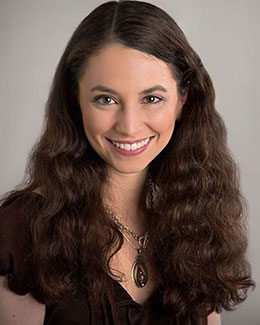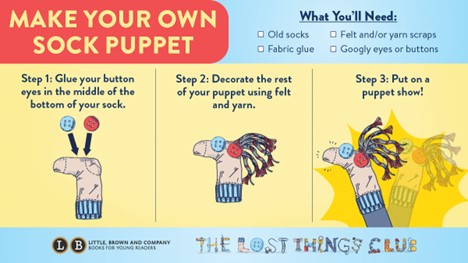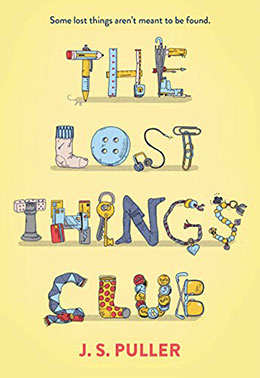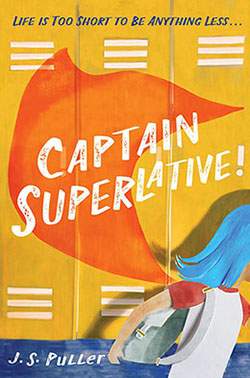
The titles of J.S. Puller’s first two books intrigued me so much that I immediately checked them out of the library.
It turns out The Lost Things Club is about a young boy who has stopped talking. His family, cousin, and friends are beside themselves. What will help TJ? Surprisingly, a laundromat, the things that are lost in said laundromat, and inventive friends who create a puppet video series about “The Land of Lost Things.” It’s a book based on today’s headlines, offering comfort and hope.
Captain Superlative!, her first book, features Janey, a quiet middle school girl who likes staying in the background, meeting a new superhero at school. That’s right. A classmate dresses in a cape, tights, a swimsuit, high-top sneakers, and a mask. No one knows who this is but Captain Superlative is seemingly fearless, standing up to bullies, helping people do good things for each other, and ultimately creating a very different community at Deerwood Park Middle School. But the superhero has a secret and Janey is determined to find out what it is.
I liked these books so much that I asked for an interview.
QUESTION: In your two books for young readers, you’ve written about an eccentric character who changes a school culture and a little boy suffering from PTSD in the aftermath of an elementary school shooting. These are serious topics. What drew you to spending countless hours writing stories about these topics?
ANSWER: My tendency to tackle serious topics with children absolutely stems from my background in theatre, specifically my studies in theatre for young audiences. A huge inspiration for me was a play by Aurand Harris, called The Arkansaw Bear. I was introduced to both Aurand Harris and his body of work by my undergraduate mentor, Rives Collins. The Arkansaw Bear is a play about death. It’s filled with music, talking animals, and magical changes. It’s a beautiful story, one that makes you laugh as much as it makes you cry. It opened my eyes to a new world of writing possibilities. It made me realize that serious topics didn’t have to be tackled in a gloomy, depressing way. While both Captain Superlative and The Lost Things Club deal with serious topics, I don’t think they’re books about the serious topics, if that makes sense. Both, in their own way, are celebrations of life. And that’s so important for young people to understand. They’re making meaning out of the world around them. Which includes a lot of ugliness. It’s vital to find the joy, even in the saddest of times.
QUESTION: Your background includes degrees in theater, elementary education, and work with social emotional behavior, creative arts, and writing plays. When did you decide to add writing books for young readers to your repertoire?
ANSWER: As my friends like to joke, I was always a writer; I was just the last one to figure it out. I started out the same way most writers probably do: Playing make-believe games on the playground. As I got older, I was determined to become first a Broadway singer (but I couldn’t sing) and then an actor (but I couldn’t act). All the while, I was constantly writing. First it was fanfiction—which I encourage students to write—and then plays. As a junior in high school, I attempted my first novel with my best friend. My second attempt was my senior year of college. It was around that time that I started to get interested in theatre for young audiences. When I graduated from undergrad, I realized that I knew a lot about theatre, but not a lot about children. If I wanted to write plays for young people, it was important to understand the audience. So I went back and I got my master’s in elementary education. The most valuable lesson I learned in graduate school? Teaching is a calling, not a career. And I didn’t have the courage and soul of a teacher, but I loved creative work with kids and I especially enjoyed children’s literature. Things just kind of flowed naturally from there. I still write plays—and I’ve even attempted to write for adults—but writing for kids and getting to visit their schools and talk to them about my books and how they can come up with their own stories just sort of feels like home.
QUESTION: The Lost Things Club includes puppetry and broadcasting a serial puppet show on YouTube. As a reader, I felt encouraged to get out materials for puppet-making. How would you like readers to respond to your creative arts inspiration?
ANSWER: Well, first, I have to give a huge shout-out to the Little Brown School and Library team, who actually put together a how-to guide for creating puppets:

Beyond that, I want to stress that I believe in the creative arts as a form of therapy. As I was beginning to outline The Lost Things Club, I was serving as a researcher assistant on a project with the UChicago Consortium on School Research and Ingenuity, Inc., which became Arts Education and Social-Emotional Learning Outcomes Among K‑12 Students: Developing a Theory of Action. This project addressed the widespread belief that arts education contributes to children’s and adolescents’ social-emotional development. There is a particular story from the fieldwork that I share over and over again, when I talk about The Lost Things Club:
A theatre teaching artist noted, in reflecting on the way in which her work might affect students socially and emotionally, that “One of the hardest things in class is showing up, just showing up.” So she designed an activity around “showing up”: having each student stand up, one by one, while the other students clapped, and recite a line using a “performance voice.” At the end of the activity, a classroom teacher approached the theatre teaching artist, so moved that she herself could barely speak, and said, “That child doesn’t talk.” The teaching artist noted that this was normal—sometimes students did not wish to talk in front of their peers. The classroom teacher replied “No, you don’t understand, it’s on his IEP. We try to get him to speak, he doesn’t speak. He has elective mutism.” But in the context of this theatre activity, he chose to use his voice. (pg. 21)
This story was a game-changer for me. It was the foundation of TJ’s character, for one thing. For another, I think it’s a profound example of the power that arts education can have over kids. I believe in art for art’s sake. But I also believe that every child can benefit from any kind of creative activity. So to get back to the question, I suppose what I want is for my readers to feel inspired to go out and do something creative. To use that energy and that passion to examine themselves and their worlds.
QUESTION: Writing about an elementary school shooting involves big emotions. How did you work with these emotions while working through your draft, subsequent revisions, and final book?
ANSWER: The answer to this is probably a healthy combination of both research and simply being a human being. I’m fortunate that I work with the marvelous researchers at the UChicago Consortium on School Research, who are constantly striving to improve outcomes for students. They were an excellent resource for writing both Captain Superlative and The Lost Things Club, directing me to some wonderful articles, journals, and studies about how students and schools deal with trauma. I also read interviews and watched documentaries, getting firsthand accounts from survivors of the tragic string of school shootings that have plagued this country, going as far back as the 1960s. This was the easy part. The harder part was examining my own feelings in this reality. As someone who works in education, I spend a lot of time on Twitter and news sites. When there’s a new incident — what an innocuous word! — I’m usually the first person in the office to know. I broke the news to my colleagues about Sandy Hook and Parkland. You cannot read about these tragedies without feeling some pretty strong emotions. Parkland, in particular, hit very close to home because that was my cousin’s high school. Now, my cousin is a few months older than I am, so he was nowhere near the school at the time of the shooting. All human beings, however, play the “What if…?” game. This fueled a lot of the emotions that Leah went through, loving her own cousin who survived something terrible. It was a simple matter of asking myself how I would feel in her situation. I’m a theatre kid. And theatre teaches you empathy. All that to say…there were occasional tears while writing. Especially the last couple of chapters. And those emotions linger on, long after the book has been published and printed. I was in Highland Park this year on the Fourth of July. I was born there, I go to that parade every single year and would have been at the shooting, if it hadn’t been for the fact that I decided to sleep late that morning. It’s pulled up a lot of those thoughts and feelings again. This will probably stay with me the rest of my life.
QUESTION: I describe your writing as “cinematic,” easily translated to a movie in my mind while I am reading. Is this a result you consciously strive for while writing?
ANSWER: First of all, thank you for saying that! It’s a lovely compliment! I think most authors will tell you that they would be thrilled to have their work adapted into movies. I know I would! However, I’m not sure I would call it a result I’m consciously striving toward. First and foremost, especially with The Lost Things Club, my goal was to write a story that read well on the page. And one that readers would find relatable, entertaining, and thought-provoking. Interestingly, Captain Superlative took something of a different journey. The story actually began as a play. As I love to tell students when I visit their schools, I wrote the outline on a Friday, the first act on a Saturday, and the second act on a Sunday. And then spent years revising it before I was lucky enough to see it produced on stage. Hearing the teenage actors recite my dialogue told me I wasn’t finished with the story, and that’s what drove me to turn it into a novel. I think it would be thrilling to see it go full circle and end up back on stage (maybe as a musical, I’ve written some songs!) or on the screen! I’m also realistic enough to know that the odds aren’t fantastic. And if my work goes no further than the page, I’m still immensely grateful.
QUESTION: Are you someone who works with a fully developed outline while writing or do you approach a book scene by scene?
ANSWER: I am a very, very stringent outliner. I absolutely cannot begin a story until I know how it ends. Obviously, drafting and revision means that things change. New scenes are added, old scenes taken away. But with both The Lost Things Club and Captain Superlative, as well as most of my plays, I had a full and complete outline before I even attempted to write a single word. I can only think of one time that I’ve ever written in a more free-form sort of way, and that was with a play that started out as an assignment. When I was in college, my playwriting professor had us go to PostSecret and select a secret, then write a scene where one character had that secret. After the assignment, I was so excited by what I’d done, that I decided to keep writing. That eventually became one of my most decorated plays, The Creator.
QUESTION: Do you have plans for more books? If so, what new challenges have you set for yourself?
ANSWER: This is an easy question to answer. Absolutely, I have plans for more books! I would be very happy to spend the rest of my life writing! Unfortunately, publishing is a very complicated business. There’s a certain stereotypical image a lot of people have in their heads of writers. They see us as eccentric loners, sitting alone in a dark room with a typewriter, cackling softly to ourselves like Golem. But it’s so much more than that! For one thing, writing is not a solitary endeavor. It requires the buy-in and feedback of dozens of other people. So, I suppose the first challenge ahead of me isn’t so much about writing as it is about finding an agent to represent me going forward. Easier said than done, especially following the pandemic, which proved fertile ground for new inspiration and new authors. That said, if I’m lucky enough to find myself an agent, I have a lot of writing challenges I would like to tackle. There are new genres I want to attempt, including urban fantasy, historical fiction, and science fiction. I also dream of one day writing a whole series! And there’s still a lot of complicated subject matter I want to address, as well. I have ideas for stories about abuse, COVID-19, racism, anti-Semitism, war, homophobia, transphobia, child actors, and a whole host of family complications. No matter what, I will keep writing. I’ve already drafted two novels this year, and I haven’t even made it to National Novel Writing Month yet!


